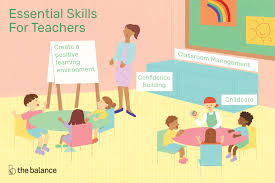The Importance of Professional Skills in Teaching
Being a teacher is not just about imparting knowledge; it also requires a set of professional skills that are essential for effective teaching and student engagement. Here are some key professional skills that every teacher should possess:
Communication Skills
Effective communication is crucial for a teacher to convey information clearly and interact with students, parents, and colleagues. Good communication skills help in building strong relationships and creating a positive learning environment.
Classroom Management
A skilled teacher knows how to manage a classroom effectively, maintain discipline, and create a conducive learning atmosphere. Classroom management skills involve setting rules, handling conflicts, and keeping students engaged throughout the lesson.
Subject Knowledge
A teacher must have a deep understanding of the subject they teach in order to deliver accurate information and answer students’ questions effectively. Continuous learning and staying updated with the latest developments in the field are essential for enhancing subject knowledge.
Adaptability
Flexibility is key for teachers to adapt their teaching methods according to students’ needs and learning styles. Being adaptable allows teachers to cater to diverse learners and make learning more accessible and engaging.
Empathy
A compassionate teacher shows empathy towards students’ challenges, motivates them to overcome obstacles, and creates a supportive learning environment. Understanding students’ emotions and perspectives helps in building trust and rapport.
Problem-Solving Skills
Teachers often face various challenges in the classroom, such as handling difficult behaviour or addressing academic struggles. Strong problem-solving skills enable teachers to find creative solutions, resolve conflicts, and support students effectively.
Organisation Skills
An organised teacher can manage time efficiently, plan lessons effectively, and keep track of student progress. Organisational skills help in maintaining order in the classroom and ensuring that educational objectives are met.
In conclusion, professional skills play a vital role in shaping an effective teacher who can inspire, educate, and empower students towards success. Continuous development of these skills through training, reflection, and feedback is essential for enhancing teaching practices and making a positive impact on students’ lives.
Five Essential Professional Skills for Teachers: Enhancing Communication, Knowledge, Empathy, Classroom Management, and Collaboration
- Develop strong communication skills to effectively convey information to students and parents.
- Continuously improve subject knowledge and teaching methods to keep lessons engaging and informative.
- Cultivate patience and empathy to understand students’ individual needs and provide appropriate support.
- Establish good classroom management techniques to create a positive learning environment.
- Collaborate with colleagues and participate in professional development opportunities to enhance teaching skills.
Develop strong communication skills to effectively convey information to students and parents.
Developing strong communication skills is crucial for teachers to effectively convey information to both students and parents. Clear and concise communication helps in ensuring that important concepts are understood, questions are answered, and expectations are communicated clearly. By honing their communication skills, teachers can create a supportive and engaging learning environment where students feel encouraged to participate and parents feel informed about their child’s progress and educational needs. Effective communication is the key to building strong relationships with both students and parents, fostering trust, collaboration, and ultimately enhancing the overall educational experience.
Continuously improve subject knowledge and teaching methods to keep lessons engaging and informative.
To excel as a teacher, it is crucial to continuously enhance both subject knowledge and teaching methods. By staying informed about the latest developments in their field and exploring innovative ways to deliver lessons, educators can ensure that their classes remain engaging and informative. This commitment to ongoing improvement not only benefits the teacher by deepening their expertise but also enriches the learning experience for students, fostering a dynamic and stimulating educational environment.
Cultivate patience and empathy to understand students’ individual needs and provide appropriate support.
Cultivating patience and empathy is a crucial tip for teachers to understand students’ individual needs and provide appropriate support. By being patient, teachers can give students the time they need to learn and grow at their own pace, fostering a supportive and inclusive learning environment. Empathy allows teachers to connect with students on a deeper level, recognising their unique challenges and motivations. Through patience and empathy, teachers can tailor their approach to meet the diverse needs of each student, ultimately enhancing their learning experience and academic success.
Establish good classroom management techniques to create a positive learning environment.
Establishing good classroom management techniques is crucial for teachers to create a positive learning environment where students feel safe, engaged, and motivated to learn. Effective classroom management involves setting clear expectations, maintaining discipline, and fostering a sense of respect among students. By implementing strong management strategies, teachers can minimise disruptions, maximise instructional time, and enhance student participation. A well-managed classroom not only promotes academic success but also contributes to the overall well-being and development of students.
Collaborate with colleagues and participate in professional development opportunities to enhance teaching skills.
Collaborating with colleagues and engaging in professional development opportunities are essential strategies for teachers to enhance their teaching skills. By working together with fellow educators, teachers can share best practices, exchange ideas, and learn from each other’s experiences. Participating in workshops, training sessions, and conferences also provides valuable opportunities for continuous learning and growth. Through collaboration and professional development, teachers can stay updated with the latest trends in education, improve their instructional techniques, and ultimately create a more enriching learning experience for their students.

Leave a Reply